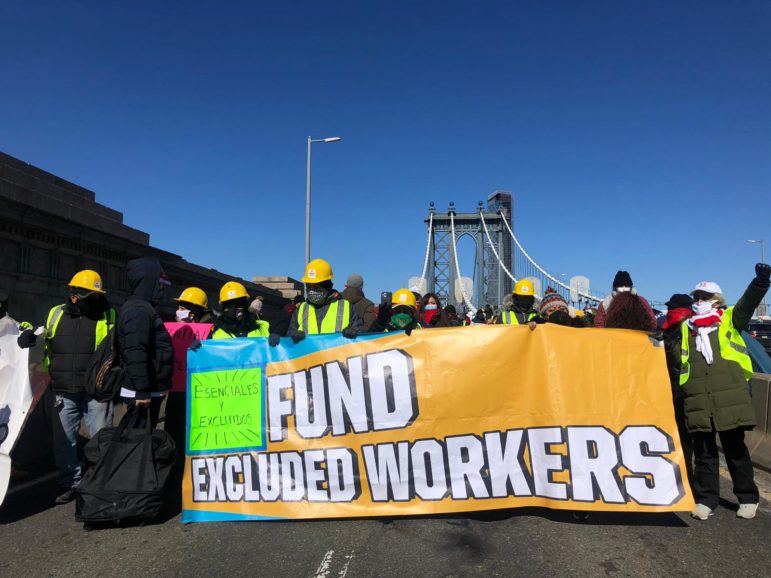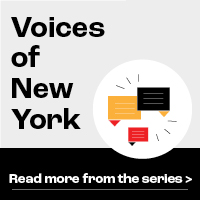A version of this article was originally reported and published in Spanish by El Diario on July 12, 2021. It was translated by Carlos Rodriguez, and has been lightly edited and updated to include new information. Additional reporting by City Limits/Jeanmarie Evelly.

Courtesy Make the Road New York
Immigrant workers and advocates marched across the Manhattan Bridge ON March 5, 2021, calling for the state budget to include funding for those who have been excluded from pandemic relief.After a long struggle to get the financial relief plan approved, the 290,000 potential beneficiaries of New York’s Excluded Workers Fund are facing a new obstacle: gathering the documentation necessary to complete the application, which is only available online.
Earlier this month, organizations and coalitions who fought for the approval of the funds gathered in front of the Department of Labor’s (DOL) offices in Lower Manhattan; advocates also rallied outside Gov. Andrew Cuomo’s office on Wednesday. They are demanding more flexible documentation requirements and the elimination of steps that could prevent some from applying come August. The exact application date is yet to be announced.
“We are asking, first of all, for the Department of Labor to open its offices and offer in-person appointments to simplify the application process. Many of our workers do not have access to the technology needed or, worse, they do not have time to come to our organizations for assistance,” said Ángeles Solís, spokesperson for Make The Road NY (MRNY.)
In addition to the difficulties posed by online-only applications, those seeking to obtain the benefit—intended to provide aid to residents who were locked out from accessing other COVID relief money—will have to figure out how to prove through a letter from their employer that they lost earnings starting in February 2020 due to COVID-related lack of work.
Another key factor to be eligible for the fund is to have had earnings below $26,208 in the last 12 months, and applicants must show that they’ve lost of at least 50 percent of their income, what advocates argue is stricter criteria than other government COVID-19 relief funds, like unemployment.
“This undercuts the purpose of the program and undervalues the sacrifices excluded workers have made,” Public Advocate Jumaane Williams said in a statement Wednesday.
Representatives of the Fund for Excluded Workers Coalition (FEW) believe that it is crucial for everyone eligible for the benefit to begin gathering their documents promptly. The coalition was formed by over 100 organizations who initiated the fight to get the $2.1 billion fund passed by the state legislature, including launching a hunger strike this past spring.
FEW leaders also encouraged employers to provide letters to workers who may qualify for the funding to allow them to receive the maximum amount of aid, which could total up to $15,600.
Although the Department of Labor will not require proof of immigration status or of eligibility to obtain a social security number, applicants must demonstrate that they were living in New York before March 27, 2020. They will also need to present proof of identity such as a valid passport, a requirement many may find hard to meet.
Mexican-born merchant Sonia Pérez, from the community organization Street Vendor Project, explained that her compatriots in particular are having trouble renewing their passports at their consulate because appointments are difficult to obtain.
“We ask the Department of Labor to be more flexible with the expiration dates of some of the required documents. It is not our fault: Many offices and agencies are still closed to the public or have many restrictions to expediting paperwork due to the pandemic,” said Pérez.
For her part, Miriam Fernández, from New York Communities for Change, summarized the demands of the organizations that are helping workers with their applications.
“All we want is for the Department of Labor to be more flexible,” said Fernández.
FEW leaders urged eligible applicants to apply, pointing out that the required documentation will only be used for the purposes of administering that benefit. Sharing that information with any other government agency, including ICE, is strictly prohibited by law.









